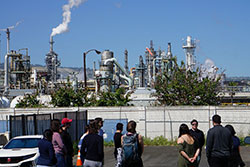Environment


The Environment Section is a community for those working to create, restore and sustain healthy environments for all through research, practice and advocacy.
Established in 1911, the Environment Section was the fourth Section of APHA and originally called the Engineering Section until it was renamed in 1970.
- Learn more about environmental health.
- Leadership contact information.
- Member section awards.
Our Work
The Environment Section works to achieve our mission through the following priorities:
- Create opportunities to connect scientists, agency representatives, nonprofit and grassroots leaders and others working together towards environmental health and justice.
- Support environmental health professionals with opportunities to engage and learn throughout their career—from students to mid-career professionals to retirees.
- Prepare and share information about environmental health science and policy in plain language to increase reach and accessibility.
- Elevate public health’s most pressing issues, including the COVID-19 pandemic and climate justice, to ensure all public health professionals recognize their role in addressing environmental health inequities, which disproportionately impact Black, Brown, Indigenous, and low-income communities.
Member Benefits
As a member of our Section, you can help grow our legacy in public health practice! We offer many opportunities to get involved, from reviewing abstracts and policy proposals to presenting your research at the Annual Meeting, taking on leadership roles and representing the Environment Section at national committee meetings or other events.
Join Us!
Your participation is vital to our continued success. Become an active member of the Section when you join APHA. If you are already an APHA member, you can join as your second Section for no additional cost by updating your member profile.
Attend Events
Check out the APHA calendar for upcoming Section events and browse our sessions at the 2024 APHA Annual Meeting and Expo.
Visit on APHA LEAD
Members can visit us on APHA LEAD to learn about upcoming events, join in discussions with other Section members, and access our Section’s resource library.
Follow on Social Media
Find us on LinkedIn to receive up-to-date information on Section happenings as well as professional development opportunities.
Contribute
Support our efforts by making a donation.
